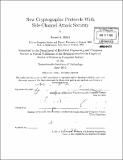New cryptographic protocols With side-channel attack security
Author(s)
Miller, Rachel A., S.M. (Rachel Ann). Massachusetts Institute of Technology
DownloadFull printable version (5.262Mb)
Other Contributors
Massachusetts Institute of Technology. Dept. of Electrical Engineering and Computer Science.
Advisor
Shafrira Goldwasser.
Terms of use
Metadata
Show full item recordAbstract
Cryptographic protocols implemented in real world devices are subject to tampering attacks, where adversaries can modify hardware or memory. This thesis studies the security of many different primitives in the Related-Key Attack (RKA) model, where the adversary can modify a secret key. We show how to leverage the RKA security of blockciphers to provide RKA security for a suite of high-level primitives. This motivates a more general theoretical question, namely, when is it possible to transfer RKA security from a primitive P1 to a primitive P2? We provide both positive and negative answers. What emerges is a broad and high level picture of the way achievability of RKA security varies across primitives, showing, in particular, that some primitives resist "more" RKAs than others. A technical challenge was to achieve RKA security without assuming the class of allowed tampering functions is "claw-free"; this mathematical assumption fails to describe how tampering occurs in practice, but was made for all prior constructions in the RKA model. To solve this challenge, we present a new construction of psuedorandom generators that are not only RKA secure but satisfy a new notion of identity-collision-resistance.
Description
Thesis (S.M.)--Massachusetts Institute of Technology, Dept. of Electrical Engineering and Computer Science, 2012. "June 2012." Cataloged from PDF version of thesis. Includes bibliographical references (p. 76-80).
Date issued
2012Department
Massachusetts Institute of Technology. Department of Electrical Engineering and Computer SciencePublisher
Massachusetts Institute of Technology
Keywords
Electrical Engineering and Computer Science.